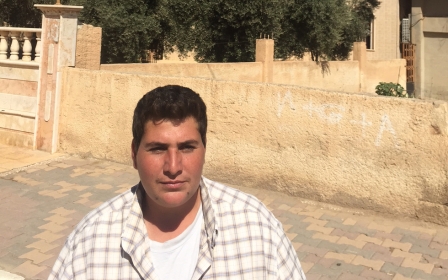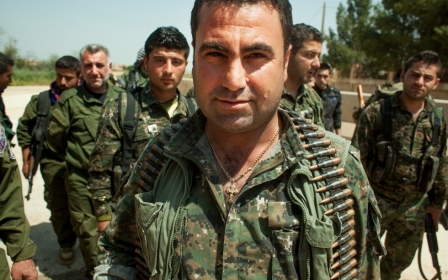Christian militias loot Christian towns in northeastern Syria

TAL TAMER, Syria - The silver cross bounced around Sherbel’s neck as he held his Kalashnikov rifle and aimed at the window of a deserted house across the narrow alleyway.
As a member of a search team of about a dozen fighters, the Christian militiaman combed through a deserted town near the city of Tal Tamer in al-Hasaka province in northeastern Syria. Today’s objective was to search the village for a Muslim militant, who had been left behind when the Islamic State group’s (IS) troops pulled out of the area about a week earlier.
Around 100 families used to live in the predominantly Christian town, before members of the Islamic State took control of the region in late February. The militants kidnapped more than 200 Christians and their offensive displaced thousands of civilians until Kurdish-led forces, supported by coalition and US airstrikes, pushed the group out of the area in late May.
In the scorching afternoon heat, militiamen peaked through broken windows, kicked in doors and defused booby traps. While they couldn’t find the militant they were originally looking for, they came across many other interesting things: household appliances, clothes, satellite receivers, gas bottles, televisions, and coffee machines. They took whatever they could use.
Three fighters lifted a washing machine onto the back of a waiting pickup truck. “Move over. Do you still have enough space?” one of them asked laughingly while loading a water boiler and a computer screen on the back seat. The unit’s commander sat quietly in the driver’s seat, supervising his men in the rear-view mirror.
Guardians of the Christian minority?
The looting fighters belong to the Syriac Military Council (MFS), Sutoro and the Khabour Guards. The Syriac militias, Sutoro and MFS, were founded after the outbreak of the civil war in Syria. They’re part of the Kurdish dominated Self-Administration Authority and cooperate closely with the Kurdish fighters and security services, which control the northeast of the country. While MFS is a military organisation, Sutoro’s fighters are mainly policing cities and manning checkpoints.
The Khabour Guards were a local Assyrian militia and worked exclusively in the Assyrian-populated region around Tal Tamer. Some of the guards appeared to be closely aligned with MFS; they wore the MFS emblem on their uniform and are armed by MFS. They were disbanded a few months after their commander fell victim to an assassination.
When talking to the media, the Syriac militias put great emphasis on respecting the laws of war and humanitarian values. “We don’t have a spirit of resistance, we’re secular Christians – we don’t like violence,” Ashur Abu Sarkun, the general commander of Sutoro at the time, told foreign journalists at the militia’s headquarters in the city of al-Malikiyya in al-Hasaka province last October.
Malki Rabo, Sutoro’s spokesperson, agreed. He said Sutoro was founded in late 2012 to protect the Christian minority in Syria and to rise up against the regime.
According to Rabo, the internal order of Sutoro focuses on the protection of the people, their rights and demands. However, Rabo said his militia was not guided by religious thinking: “Of course we don’t forget God, but we believe that showing mercy is more important than interfering.”
Local commanders knew about looting
Rabo supervises the transport of stolen goods in front of the Sutoro checkpoint in Tal Tamer.
Two pickups just returned from another search operation. The sidewalk in front of the checkpoint resembles a flea market. An MFS fighter, panting, carries a television into the building.
“What took you guys so long? Is this everything?” asked Abu Jemma, the base’s cook, while looking critically at the television. The question becomes irrelevant when more militiamen bring in their loot.
“I don’t know what it is, but it has something to do with oil and ISIS,” yells Maher, a Sutoro member from Qamishli city in al-Hasaka province, while raising a spanner above his head.
The militiamen carry small things like computer boards, tea sets and computer screens across the front yard, but also a washing machine, a microwave and a set of wheel caps end up in the back of a minibus, which transports the goods to the party’s warehouse.
Before the bus is allowed to leave, Rabo thoroughly searches the bags of of each fighter.
Eighty dollars per month
Several MFS and Sutoro members admitted to MEE the militias have looted on numerous occasions.
According to the fighters, most of the looting took place in the predominantly Christian towns around the Syrian city of Tal Tamer, but a militiaman also told MEE that a MFS fighter stole jewellery out of Yazidi houses around Mt Sinjar in northern Iraq.
However, not all militiamen agree with the looting. “The term ‘search operation’ is just another word for stealing and looting but that doesn’t mean it’s alright,” said a young Sutoro fighter in Tal Tamer, who asked to remain anonymous. “Why should a village be searched several times after it was liberated? It’s obvious that it’s only about money.”
The fighter explained that some militiamen need additional income in order to feed their families. The monthly salary is about $80, very little by Syrian standards.
“Many people only work with us because of the salary. The salary is a bad joke, but it’s still better than nothing. There’s no other work,” said Fadi Khorye, a Sutoro member from Derik. He also stressed that not every militiaman was involved in the looting.
“Just as the fingers of a hand are different from each other, the members of Sutoro are. The reputation of our organisation will now suffer from their actions, and I hope that the culprits will be held accountable.”
Leadership turns a blind eye on violations
Confronted with MEE’s findings, Kino Gabriel, MFS spokesperson, said an internal committee had been formed in order to investigate the events. According to Kino, any possible wrongdoings could only be attributed to a few isolated individuals.
“MFS is committed to the values of the Syriac and Christian people. What happened contradicts the values and principles, which we defend, in which we believe and according to which we were raised.”
A day later, the Sutoro and MFS leadership rebuked all accusations in a joint press statement.
A Sutoro commander with knowledge of the internal investigations confirmed to MEE that Sutoro and MFS militiamen looted in several villages in the Tal Tamer area. For security reasons he asked to remain anonymous.
While the commander confirmed that Christian homes were looted, he said the vast majority of the looting took place in houses of Arab ISIS collaborators. However, according to the commander, the militia’s leadership would never publicly acknowledge any looting.
“If we admit publicly that we looted, we’ll be held responsible for all the looting. We don’t want to be held accountable for the violations committed by YPG and ISIS.”
The commander said that he’s not concerned that by looting the homes of alleged ISIS collaborators, the fighters might have committed a war crime.
“Honestly, if it was up to me they might as well spray ‘F**k ISIS’ on their walls and burn their houses down.”
New MEE newsletter: Jerusalem Dispatch
Sign up to get the latest insights and analysis on Israel-Palestine, alongside Turkey Unpacked and other MEE newsletters
Middle East Eye delivers independent and unrivalled coverage and analysis of the Middle East, North Africa and beyond. To learn more about republishing this content and the associated fees, please fill out this form. More about MEE can be found here.




